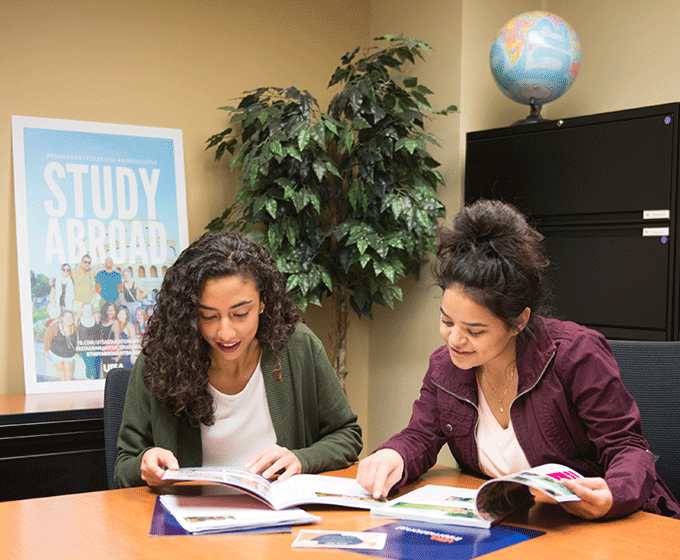
NOVEMBER 4, 2021 — Nathan Richardson, chair of the Department of Modern Languages and Literatures and associate dean for undergraduate studies in the College of Liberal and Fine Arts, has been awarded a grant of close to $500,000 from the National Endowment for the Humanities.
The grant supports UTSA’s global language initiative known as the Sustainable Cultural Recovery Program, a year-long recovery language academy that helps UTSA students regain cultural and linguistic experiences lost due to the COVID-19 study abroad interruption.
“We will be providing low-cost experiences for these students to try to make up for some of the ground they lost and hopefully inspire them to finally get abroad once this pandemic is over and it’s safe to move about the world,” Richardson said.
The language program is for the hundreds of UTSA students whose plans to study, work and research abroad were canceled due to pandemic-related restrictions. The global pandemic had an overwhelming effect on the study abroad program, which offers linguistic progress and cultural opportunities for students who’ve never traveled abroad.
“San Antonio is a place where Spanish and many other languages are spoken,” Richardson added. “We are bringing language and cultural immersion to our students’ front door.”
Travel abroad experiences and bilingualism give students a competitive advantage in their educational career and in today’s job markets, as they will be able to build linguistic and intercultural competence that employers value.
The language recovery initiative will also partner with the San Antonio Language Academy (SALA), which provides undergraduate instruction in Spanish, Chinese, French, German and other languages. SALA will provide UTSA students with experiences involving innovative courses, activities, and local field trips, including multi-week co-curricular language immersion experiences in Spanish, Japanese and Korean.
All of these programs aim to engage students in languages, cultures and traditions that will help them develop fluency in their second or third language and acquire intercultural expertise. The courses also enable students to “make sense of the otherness” that multicultural and first-generation students feel in heterogenous border communities.
San Antonio is one of the fastest growing cities in the United States, with 42.8% of its residents speaking languages other than English at home, according to the 2019 American Community Survey. San Antonio’s number of bilingual citizens places the city in a unique pantheon.
“The people who awarded the grant clearly understood what a special place San Antonio is with its rich multilingual and multicultural heritage,” Richardson said. “We look around and see a major metropolitan area really unique in the number of bilingual citizens and the number of people here with international experience.”
In total, the National Endowment for the Humanities made available close to $88 million in American Rescue Plan relief funding for economic recovery to cultural and educational institutions. UTSA’s funding will be administered through the Office of Global Initiatives and the Department of Modern Languages and Literatures. It supports the advancement of the humanities with a global focus and assists UTSA faculty to develop other programs that will spur experiential learning.
The Sustainable Cultural Recovery Program at UTSA is part of the university’s vision to be a premier public research university, providing access to educational excellence and preparing citizen leaders for the global environment.
UTSA Today is produced by University Communications and Marketing, the official news source of The University of Texas at San Antonio. Send your feedback to news@utsa.edu. Keep up-to-date on UTSA news by visiting UTSA Today. Connect with UTSA online at Facebook, Twitter, Youtube and Instagram.
Move In To COLFA is strongly recommended for new students in COLFA. It gives you the chance to learn about the Student Success Center, campus resources and meet new friends!
Academic Classroom: Lecture Hall (MH 2.01.10,) McKinney Humanities BldgWe invite you to join us for Birds Up! Downtown, an exciting welcome back event designed to connect students with the different departments at the Downtown Campus. Students will have the opportunity to learn about some of the departments on campus, gain access to different resources, and collect some giveaways!
Bill Miller PlazaJoin us for an intimate evening of cocktails, conversation, and culinary inspiration with Pati Jinich, Emmy-nominated chef and James Beard Award-winning author. Enjoy light bites and signature drinks in the warm, modern setting of Mezquite as Pati connects with guests over her passion for Mexican cuisine and storytelling.
Mezquite Restaurant in Pullman Market, 221 Newell Ave., San Antonio 78215From inspired courses to thoughtful pairings and a rich sense of community, the Ven a Comer Signature Dinner is a night of shared meals, shared stories, and unforgettable flavor.
Stable Hall (Pear Brewery), 307 Pearl Pkwy, San Antonio 78215Come and celebrate this year's homecoming at the Downtown Campus with food, games, giveaways, music, and more. We look forward to seeing your Roadrunner Spirit!
Bill Miller PlazaThe University of Texas at San Antonio is dedicated to the advancement of knowledge through research and discovery, teaching and learning, community engagement and public service. As an institution of access and excellence, UTSA embraces multicultural traditions and serves as a center for intellectual and creative resources as well as a catalyst for socioeconomic development and the commercialization of intellectual property - for Texas, the nation and the world.
To be a premier public research university, providing access to educational excellence and preparing citizen leaders for the global environment.
We encourage an environment of dialogue and discovery, where integrity, excellence, respect, collaboration and innovation are fostered.